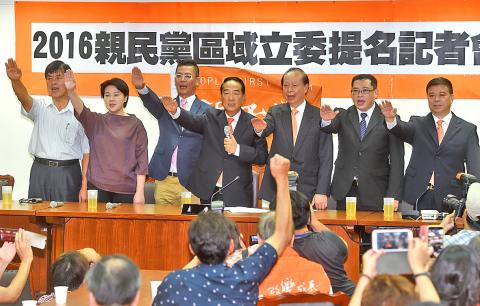People First Party (PFP) Chairman James Soong (宋楚瑜) yesterday said he would consider running for president if he thinks the two major parties’ policies have been “hijacked by fundamentalists.”
The PFP held a press conference in Taipei to announce its five legislative candidates for the Jan. 16 elections. Three of the candidates are former Chinese Nationalist Party (KMT) legislators, including Chang Sho-wen (張碩文), who just withdrew from the KMT earlier this week.
Soong likened the KMT to an apothecary that “sells counterfeit medicine.”

Photo: Chien Jung-fong, Taipei Times
“It is not that the PFP has turned ‘green,’” Soong said, addressing criticism that the party has aligned itself with the Democratic Progressive Party (DPP). “It is that we can no longer say for sure whether the KMT is lan [藍, blue] or just lan [爛, rotten].”
The PFP has always been Sun Yat-sen’s (孫逸仙) disciple and a resolute follower of former president Chiang Ching-kuo’s (蔣經國) path in safeguarding the Constitution of the Republic of China and Taiwanese democracy, as well as pushing for cross-strait reconciliation, Soong said.
“The PFP is willing to stand by good KMT candidates, but if the KMT cannot break away from [President Ma Ying-jeou’s (馬英九) inner circle], we have no other choice but to field our own,” the chairman said.
When asked whether he would run for president, Soong said he would consider the possibility if the public calls for it, but added that it was not yet time to make a decision and he would continue to keep an eye on the KMT’s and the DPP’s policies.
Separately yesterday, KMT Legislator Cheng Ru-fen (鄭汝芬) of Changhua County said she would turn down the party’s legislative nomination. She is the seventh KMT lawmaker who has decided not to run for another term.
Cheng’s announcement came hours after KMT Legislator Chang Chia-chun (張嘉郡) voiced her misgivings about KMT presumptive presidential nominee Hung Hsiu-chu’s (洪秀柱) cross-strait proposal of “one China, common interpretation” and threatened to withdraw from the party.
“Public opinion has changed after the nine-in-one elections in November last year. The KMT would be going against the tide of public opinion if it does not undertake reforms,” Cheng said.
Hung, when asked about the show of disapproval from several KMT lawmakers, said she would work on improving communication with lawmakers.
Hung’s spokesperson, Jack Yu (游梓翔), said that the deputy legislative speaker’s team has been communicating with party comrades about her cross-strait policy.
He said that after talking to some party members, they “have grasped the content of the policy and believe that Hung’s cross-strait policy reflects Taiwanese mainstream opinion.”
The policy is a demand that “Beijing respect the existence of the Republic of China as a fact, based on the ‘1992 consensus,’” Yu said.

Nipah virus infection is to be officially listed as a category 5 notifiable infectious disease in Taiwan in March, while clinical treatment guidelines are being formulated, the Centers for Disease Control (CDC) said yesterday. With Nipah infections being reported in other countries and considering its relatively high fatality rate, the centers on Jan. 16 announced that it would be listed as a notifiable infectious disease to bolster the nation’s systematic early warning system and increase public awareness, the CDC said. Bangladesh reported four fatal cases last year in separate districts, with three linked to raw date palm sap consumption, CDC Epidemic Intelligence

The manufacture of the remaining 28 M1A2T Abrams tanks Taiwan purchased from the US has recently been completed, and they are expected to be delivered within the next one to two months, a source said yesterday. The Ministry of National Defense is arranging cargo ships to transport the tanks to Taiwan as soon as possible, said the source, who is familiar with the matter. The estimated arrival time ranges from late this month to early next month, the source said. The 28 Abrams tanks make up the third and final batch of a total of 108 tanks, valued at about NT$40.5 billion

Two Taiwanese prosecutors were questioned by Chinese security personnel at their hotel during a trip to China’s Henan Province this month, the Mainland Affairs Council (MAC) said yesterday. The officers had personal information on the prosecutors, including “when they were assigned to their posts, their work locations and job titles,” MAC Deputy Minister and spokesman Liang Wen-chieh (梁文傑) said. On top of asking about their agencies and positions, the officers also questioned the prosecutors about the Cross-Strait Joint Crime-Fighting and Judicial Mutual Assistance Agreement, a pact that serves as the framework for Taiwan-China cooperation on combating crime and providing judicial assistance, Liang

Reports of Taiwanese going missing, being detained or interrogated, or having their personal liberties restricted in China increased about fourfold annually last year, the Mainland Affairs Council (MAC) said yesterday. Last year, 221 Taiwanese who traveled to China were reported missing, were detained and interrogated, or otherwise had their personal freedom restricted, up from 55 the previous year, the council said. Reopening group tours to China would be risky, as it would leave travelers with no way to seek help through official channels after Beijing shut down dialogue between the associations tasked with handling cross-strait tourism, the MAC said. Taipei’s Taiwan Strait Tourism